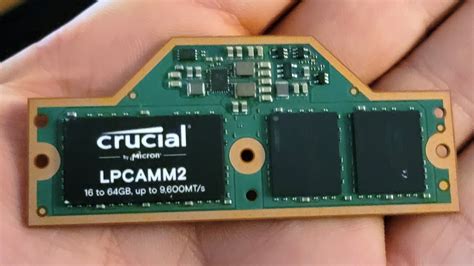The world of laptop memory upgrades is on the brink of a revolution with the introduction of LPCAMM2. This modular and repairable memory standard is set to change the way we interact with laptop components. Unlike traditional soldered-on memory, LPCAMM2 offers a more flexible approach to upgrading RAM, potentially reducing costs for manufacturers and providing consumers with the freedom to enhance their devices.
One intriguing aspect highlighted in the user comments is the potential impact of LPCAMM2 on popular laptop brands like Apple, Dell, and Lenovo. While some users express doubts about Apple’s adoption due to design constraints, others see a shift towards more repairable products from industry giants. The discussion around right to repair laws further emphasizes the importance of standardized, upgradeable components in modern laptops.
Technical insights into LPCAMM2 shed light on its advantages over traditional memory configurations. By enabling a higher level of modularity and repairability, LPCAMM2 not only benefits end-users looking to extend the lifespan of their laptops but also simplifies the repair process for manufacturers and service providers. The shift towards a more open and standardized memory standard could lead to a new era of laptop upgradability and longevity.
The user comments also touch upon the role of high-performance connectors in the adoption of LPCAMM2. While some express concerns about the reliability and longevity of the compression connectors, others envision a future where LPCAMM2 becomes a widely accepted industry standard. The potential for ECC support and the integration of LPDDR type memory chips further expand the possibilities for future laptop memory configurations.
As the tech community anticipates the widespread implementation of LPCAMM2, the conversation around efficiency, cost-effectiveness, and user experience continues to evolve. From discussions on the impact of memory bandwidth to the feasibility of integrating LPCAMM2 in thin and light laptops, the future of laptop memory remains a topic of keen interest for both consumers and industry experts.
Looking ahead, the collaborative efforts of major laptop manufacturers like Dell and Lenovo in embracing LPCAMM2 signal a significant shift towards more sustainable and user-friendly laptop designs. Whether this new memory standard will catalyze a broader trend towards modular components in laptops remains to be seen, but the initial response from the tech community indicates a positive outlook on the future of laptop memory upgrades.
With LPCAMM2 paving the way for a more accessible and repairable laptop memory landscape, consumers can expect greater flexibility and longevity from their devices. The convergence of technical innovation and consumer demand is reshaping the laptop industry, offering a glimpse into a future where upgradeable components are not just a luxury but a standard feature in modern laptops.


Leave a Reply